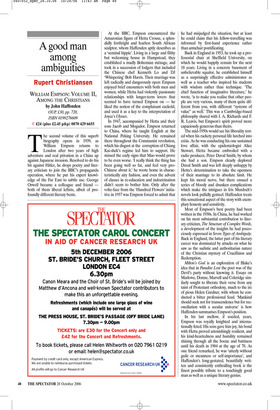A good man among ambiguities
Rupert Christiansen
WILLIAM EMPSON: VOLUME II, AMONG THE CHRISTIANS by John Haffenden OUP, £30, pp. 720, ISBN 0199276609 ✆ £24 (plus £2.45 p&p) 0870 429 6655 The second volume of this superb biography opens in 1939, as William Empson returns to London after two years of high adventure and real privation in a China up against Japanese invasion. Resolved to do his bit against Hitler, he drops poetry and literary criticism to join the BBC’s propaganda operation, where he put his expert knowledge of the Far East to subtle use. George Orwell became a colleague and friend both of them liberal leftists, albeit of profoundly different literary bents. At the BBC, Empson encountered the Amazonian figure of Hetta Crouse, a splendidly forthright and fearless South African sculptor, whom Haffenden aptly describes as a ‘seminal hippie’. Living in a large and filthy but welcoming house in Hampstead, they established a madly Bohemian ménage, and took in a succession of lodgers that included the Chinese chef Kenneth Lo and DJ ‘Whispering’ Bob Harris. Their marriage was left radically and dangerously open: Empson enjoyed brief encounters with both men and women, while Hetta had violently passionate relationships with longer-term lovers that seemed to have turned Empson on — he liked the notion of the complaisant cuckold, and used it as a key to the interpretation of Joyce’s Ulysses.
In 1947, accompanied by Hetta and their sons Jacob and Mogador, Empson returned to China, where he taught English at the National Peking University. He remained there throughout the Communist revolution, which his disgust at the corruption of Chiang Kai-shek’s regime led him to support. He missed the early signs that Mao would prove to be even worse. ‘I really think the thing has been going well so far, and feel very proChinese about it,’ he wrote home in characteristically airy fashion, and even the advent of classes in re-education and indoctrination didn’t seem to bother him. Only after the volte-face from the ‘Hundred Flowers’ initiative in 1957 was Empson forced to admit that he had misjudged the situation, but at least he could claim that his fellow-travelling was informed by first-hand experience rather than armchair pontificating.
Back in England in 1953, he took up a professorial chair at Sheffield University, on which he would happily remain for the next 18 years. Living in a concrete basement of unbelievable squalor, he established himself as a surprisingly effective administrator as well as a teacher who inspired his students with wisdom rather than technique. ‘The chief function of imaginative literature,’ he wrote, ‘is to make you realise that other people are very various, many of them quite different from you, with different “systems of value” as well.’ This was a Cambridge-based philosophy shared with I. A. Richards and F. R. Leavis, but Empson’s spirit proved more capaciously generous than theirs.
The mid-1950s would see his liberality tested when his rackety personal life lurched into crisis. As he was conducting his one sustained love affair, with the epidemiologist Alice Stewart, Hetta became embroiled with a radio producer, Peter Duval Smith, by whom she had a son. Empson clearly deplored Duval Smith and was left deeply unhappy by Hetta’s determination to take the openness of their marriage to its absolute limit. He kept his moral nerve, but there ensued a series of bloody and drunken complications which make the intrigues in Iris Murdoch’s novels look pallidly genteel. Haffenden treats this sensational aspect of the story with exemplary honesty and sensitivity.
Most of Empson’s best poetry had been written in the 1930s. In China, he had worked on his most substantial contribution to literary criticism, The Structure of Complex Words, a development of the insights he had precociously expressed in Seven Types of Ambiguity. Back in England, the latter part of his literary career was dominated by attacks on what he saw as the sadistic and authoritarian nature of the Christian mystery of Crucifixion and Redemption.
Milton’s God is an exploration of Blake’s idea that in Paradise Lost the poet was of the Devil’s party without knowing it. Essays on Marlowe, Donne, Marvell and Coleridge similarly sought to liberate their verse from any taint of Protestant orthodoxy, much to the ire of pious Helen Gardner, with whom he conducted a bitter professional feud. ‘Mankind should seek not for transcendence but for reconciliation with a secular universe’ is how Haffenden summarises Empson’s position.
In his last mellow, if sozzled, years, Empson was royally knighted and internationally feted. His sons gave him joy, his bond with Hetta proved astonishingly resilient, and his kind-heartedness and humility remained shining through all the booze and battiness until his death in 1984 at the age of 78. As one friend remarked, he was ‘utterly without guile or meanness or self-importance’, and Haffenden’s long-gestated, beautifully written and consistently enthralling book is the finest possible tribute to a touchingly good man as well as a unique literary genius.


























































































 Previous page
Previous page